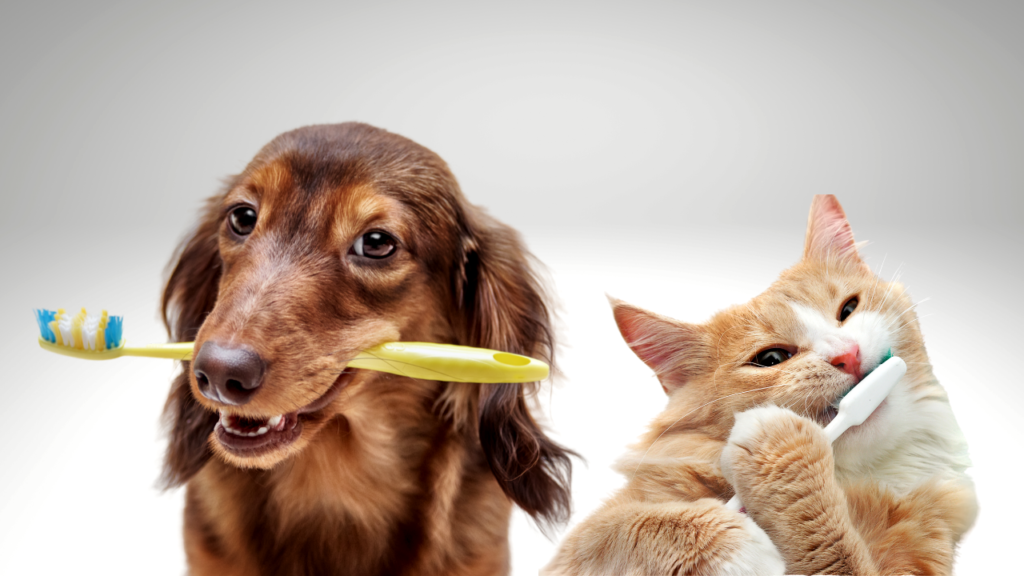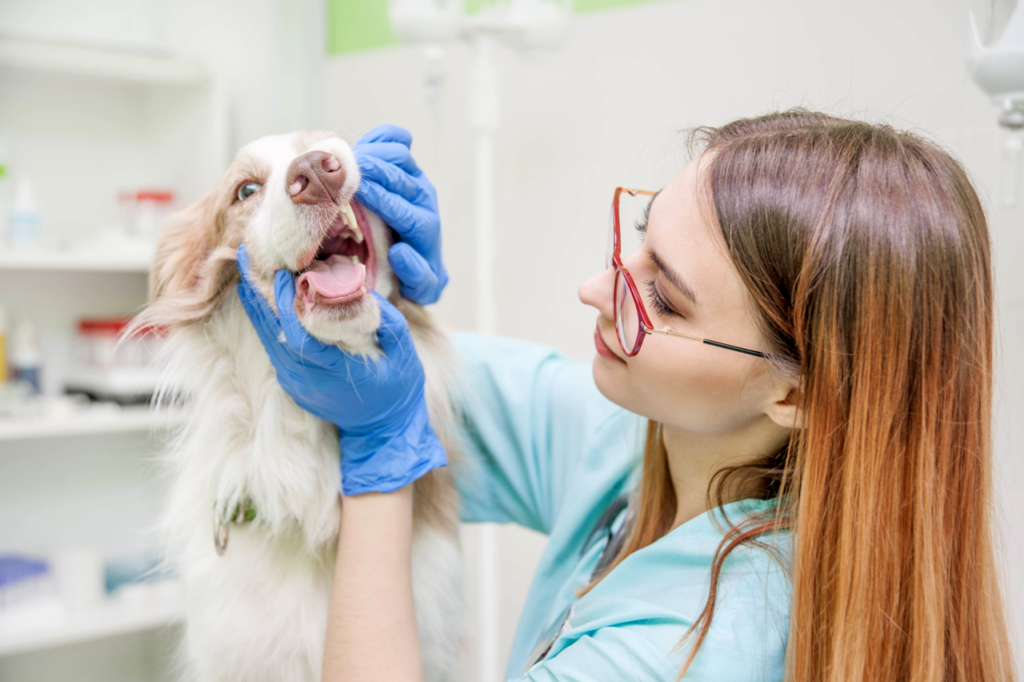
Pet Dental Care: Tips for a Healthy Smile
Pets are an integral part of our families, and just like us, they require proper dental care to maintain their overall health and well-being. While many pet owners focus on aspects like nutrition and exercise, dental hygiene often gets overlooked. However, neglecting your pet’s dental health can lead to various dental issues and even affect their overall health. In this article, we’ll delve into the importance of pet dental care and provide practical tips to ensure your furry friend enjoys a healthy smile.
Read More: The Importance of Pet Dental Health: Preventing Tooth Decay and Gum Disease
Importance of Pet Dental Care

Dental care is not just about maintaining a sparkling smile; it’s about safeguarding your pet’s overall health. Poor dental hygiene can lead to a myriad of dental problems such as periodontal disease, tooth decay, and gingivitis. These issues not only cause discomfort but can also have serious consequences for your pet’s organs, including the heart, liver, and kidneys. Bacteria from dental infections can enter the bloodstream and lead to systemic diseases, highlighting the interconnectedness of dental health and overall well-being.
Impact on Overall Health
Healthy teeth and gums are essential for your pet’s ability to eat, chew, and play comfortably. Dental problems can hinder these basic functions, leading to weight loss, nutritional deficiencies, and decreased quality of life. Additionally, dental diseases can exacerbate existing health conditions and compromise your pet’s immune system, making them more susceptible to other illnesses. By prioritizing your pet’s dental health, you’re not just ensuring a beautiful smile; you’re safeguarding their overall vitality and longevity.
Prevention of Dental Diseases
The old adage “prevention is better than cure” rings especially true when it comes to pet dental care. Implementing a regular dental care routine can help prevent the onset of dental diseases and save your pet from unnecessary pain and suffering. Simple measures such as daily brushing, providing dental treats, and scheduling professional cleanings can significantly reduce the risk of plaque and tartar buildup, thereby lowering the likelihood of gum disease and tooth decay. Investing in preventive dental care now can save you and your pet from costly dental treatments and health complications in the future.
Signs of Dental Issues in Pets
Detecting dental issues in pets can be challenging, as they are often adept at hiding pain and discomfort. However, there are certain signs that pet owners should be vigilant about, as they could indicate underlying dental problems.
Bad Breath
Persistent bad breath, also known as halitosis, is one of the most common signs of dental issues in pets. While it’s normal for pets to have occasional “doggie breath,” foul-smelling breath that persists despite regular brushing and dental care could indicate gum disease, tooth decay, or oral infections.
Bleeding Gums
Healthy gums should be pink, firm, and free from bleeding. If you notice bleeding or swollen gums, it could be a sign of gingivitis or periodontal disease. Gum inflammation and bleeding occur when plaque and tartar accumulate along the gum line, leading to irritation and infection of the gum tissues.
Excessive Drooling
While some drooling is normal for certain breeds, excessive drooling, especially if it’s accompanied by other signs such as reluctance to eat or pawing at the mouth, could indicate oral pain or discomfort. Excessive drooling is often seen in pets with dental issues such as broken teeth, abscesses, or foreign objects lodged in the mouth.
Tips for Pet Dental Care

Maintaining your pet’s dental health requires a combination of home care and professional intervention. Here are some practical tips to ensure your pet enjoys a healthy smile:
Regular Brushing
Brushing your pet’s teeth is the cornerstone of good dental hygiene. Aim to brush your pet’s teeth daily using a pet-specific toothbrush and toothpaste. Start slowly and gradually increase the duration of brushing sessions as your pet becomes accustomed to the routine. Focus on the outer surfaces of the teeth, as this is where plaque and tartar tend to accumulate the most.
Dental Treats and Chews
In addition to regular brushing, provide your pet with dental treats and chews designed to promote oral health. Dental treats are specially formulated to reduce plaque and tartar buildup while satisfying your pet’s natural chewing instincts. Look for products approved by veterinary dentists and avoid treats that are high in sugar or contain artificial ingredients.
Professional Cleanings
Schedule regular dental cleanings with your veterinarian to remove stubborn plaque and tartar buildup that brushing alone may not address. Professional cleanings typically require anesthesia to ensure your pet remains still and comfortable during the procedure. Your veterinarian will perform a thorough oral examination and may recommend additional treatments such as tooth extractions or periodontal therapy if necessary.
Choosing the Right Dental Products
Selecting the right dental products is essential for effective pet dental care. Here are some factors to consider when choosing dental products for your pet:
Toothbrushes
Choose a toothbrush specifically designed for pets, with soft bristles and an angled head for easy access to all areas of your pet’s mouth. Avoid using human toothbrushes, as they may be too harsh and uncomfortable for your pet’s sensitive gums.
Toothpaste
Use toothpaste formulated specifically for pets, as human toothpaste can be toxic if swallowed. Pet toothpaste comes in a variety of flavors like poultry, beef, and seafood, making it more appealing to your furry friend. Choose a toothpaste that contains enzymes or antimicrobial agents to help combat plaque and bacteria.
Dental Rinses
Dental rinses can help freshen your pet’s breath and reduce plaque and tartar buildup between brushings. Look for alcohol-free rinses that are safe for pets and easy to administer. Some rinses contain ingredients like chlorhexidine or zinc gluconate, which have antibacterial properties and can help maintain oral hygiene.
Diet and Nutrition
Diet plays a significant role in your pet’s dental health. Feeding a balanced diet that is rich in nutrients and free from excessive sugars and carbohydrates can help prevent dental issues and promote overall well-being. Avoid feeding table scraps and sugary treats, as these can contribute to plaque formation and increase the risk of tooth decay. Instead, opt for dental-friendly treats and snacks that promote chewing and help keep your pet’s teeth clean and healthy.
Regular Veterinary Checkups

Regular veterinary checkups are essential for maintaining your pet’s dental health. Your veterinarian can perform comprehensive dental exams and provide guidance on home care practices. Here’s why regular checkups are crucial:
Importance of Routine Examinations
Routine dental exams allow veterinarians to detect dental issues early and address them before they progress into more serious problems. Your veterinarian will examine your pet’s teeth, gums, and oral cavity for signs of dental disease, such as plaque, tartar, gingivitis, and oral tumors. Early detection and intervention can prevent pain and discomfort for your pet and save you money on costly dental treatments down the line.
Early Detection of Dental Problems
Early detection of dental problems is key to preventing irreversible damage to your pet’s teeth and gums. During a dental exam, your veterinarian may recommend diagnostic tests such as dental X-rays to evaluate the underlying structures of the teeth and identify any hidden abnormalities. Based on the findings, your veterinarian will develop a personalized treatment plan to address your pet’s dental needs and improve their oral health.
Read More: Braces to Fix Your Dogs Teeth
FAQs
- How often should I brush my pet’s teeth? Aim to brush your pet’s teeth at least 2-3 times per week to maintain optimal oral health. Daily brushing is ideal, but even a few times a week can make a significant difference in preventing plaque and tartar buildup.
- Are there any alternatives to brushing for pet dental care? While brushing is the most effective method for removing plaque and tartar, there are alternative options available for pet owners who struggle to brush their pet’s teeth. Dental treats, chews, and rinses can help supplement your pet’s oral hygiene routine and provide additional benefits for their dental health.
- Can dental treats replace brushing? Dental treats can help reduce plaque and tartar buildup, but they should not replace regular brushing. While treats can be a convenient and enjoyable way to promote oral health, they are not as effective as brushing for removing plaque and preventing dental disease.
- How can I tell if my pet has dental issues? It’s essential to be proactive in monitoring your pet’s dental health and watching for signs of dental issues. Common signs of dental problems in pets include bad breath, bleeding gums, swollen or red gums, difficulty eating or chewing, pawing at the mouth, and drooling excessively. If you notice any of these signs or other abnormalities in your pet’s oral health, consult your veterinarian for a thorough examination and appropriate treatment.
- Is anesthesia necessary for professional dental cleanings? Yes, anesthesia is typically required for professional dental cleanings to ensure your pet remains still and cooperative during the procedure. Anesthesia allows the veterinarian to perform a thorough cleaning of your pet’s teeth and gums, including scaling, polishing, and probing for any underlying issues. While anesthesia does carry some risks, your veterinarian will take steps to minimize these risks and ensure your pet’s safety and comfort throughout the dental procedure.
The Final Words
Prioritizing your pet’s dental health is essential for their overall well-being and longevity. By implementing a comprehensive dental care routine that includes regular brushing, providing dental treats, scheduling professional cleanings, and maintaining a balanced diet, you can help ensure your furry friend enjoys a healthy smile for years to come.







